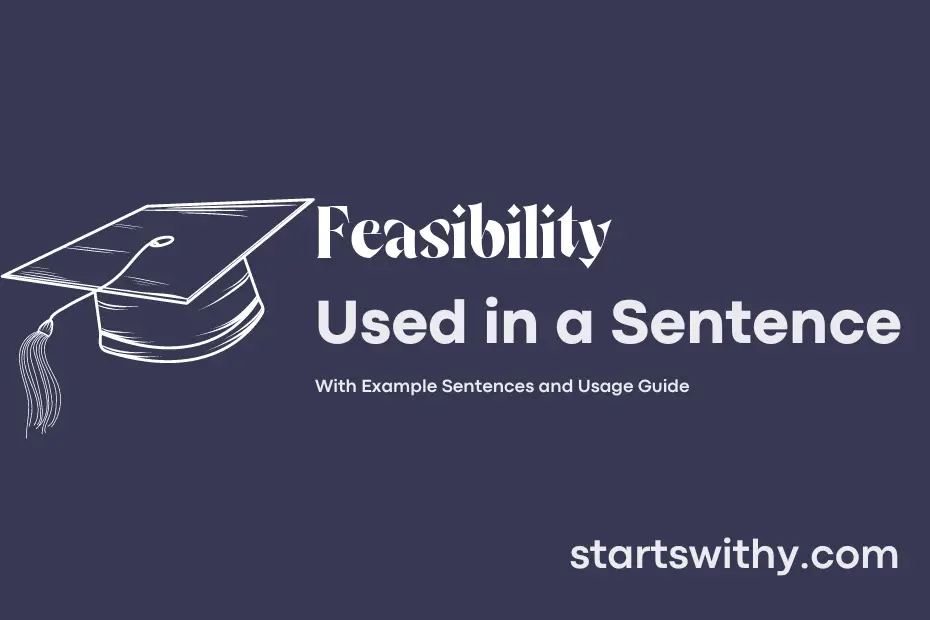Have you ever wondered about the feasibility of a project or idea? Feasibility simply refers to the possibility of something being achievable or practical.
Assessing the feasibility of a plan involves looking at various factors such as cost, resources, time constraints, and potential risks. By determining the feasibility of a project early on, you can make informed decisions and better plan for success.
7 Examples Of Feasibility Used In a Sentence For Kids
- Feasibility is about figuring out if something is possible.
- We need to check the feasibility of our idea before starting.
- Let’s think about the feasibility of building a treehouse.
- Can you tell me the feasibility of growing tomatoes in our garden?
- Exploring the feasibility of a new game can be fun.
- We should talk to experts to learn more about the feasibility of our project.
- Understanding feasibility helps us make smart decisions.
14 Sentences with Feasibility Examples
- Feasibility studies are necessary before starting any new project or venture.
- It’s important to consider the feasibility of taking up a part-time job to cover expenses.
- Assessing the financial feasibility of studying abroad is crucial for international students.
- Before committing to a study group, it’s best to evaluate the feasibility of everyone’s schedules.
- The feasibility of organizing a college event depends on factors like location and budget.
- Understanding the feasibility of pursuing a double major requires careful planning.
- Planning a road trip with friends involves checking the feasibility of transportation options.
- Evaluating the feasibility of internships is important for gaining practical work experience.
- The feasibility of launching a startup while in college requires market research and planning.
- Considering the feasibility of joining a sports team involves balancing academic and athletic commitments.
- Researching the feasibility of studying for competitive exams alongside regular coursework is essential.
- Students should assess the feasibility of volunteering opportunities before committing time and effort.
- The feasibility of participating in a study abroad program depends on factors like cost and curriculum compatibility.
- Checking the feasibility of attending workshops or seminars can help students enhance their skills and knowledge.
How To Use Feasibility in Sentences?
Feasibility is the likelihood of something being possible or successful. To use feasibility in a sentence, you can follow these steps:
-
Identify the context: First, you need to identify a situation or task where you want to discuss the possibility or practicality of something. This could be related to a project, plan, idea, or goal.
-
Determine the possibility: Consider whether the task or idea is realistic or achievable. Think about the resources, time, and efforts required to accomplish it.
-
Construct the sentence: Once you have assessed the feasibility of the situation, formulate a sentence that conveys this evaluation. For example, “The feasibility of completing the project within the given timeline is questionable.”
-
Check the sentence: Review your sentence to ensure that it clearly communicates the extent to which something is possible or achievable. Make sure the sentence accurately reflects your assessment of feasibility.
-
Practice using feasibility: To become more comfortable using the word feasibility, try incorporating it in different sentences related to various scenarios. This will help you build confidence in expressing the likelihood of success or practicality in different contexts.
Remember, using feasibility in a sentence is about expressing the possibility or likelihood of something happening or being accomplished. With practice, you will become more adept at incorporating this term effectively in your writing and conversations.
Conclusion
In conclusion, the examples of sentences with the keyword “feasibility” demonstrate the assessment of the practicality and possibility of various ideas or projects. These sentences illustrate considerations made regarding the viability, sustainability, and likelihood of success of proposed solutions or plans. By analyzing the feasibility of different options, individuals and organizations can make informed decisions and prioritize actions with realistic outcomes.
Understanding the feasibility of a concept involves evaluating factors such as resources, cost, time, and impact. Through the construction of sentences using this keyword, we gain insight into the process of determining the feasibility of ideas and initiatives, helping to guide effective problem-solving and strategic planning. Ultimately, assessing feasibility is essential for ensuring that projects are well-planned, achievable, and aligned with desired objectives.



